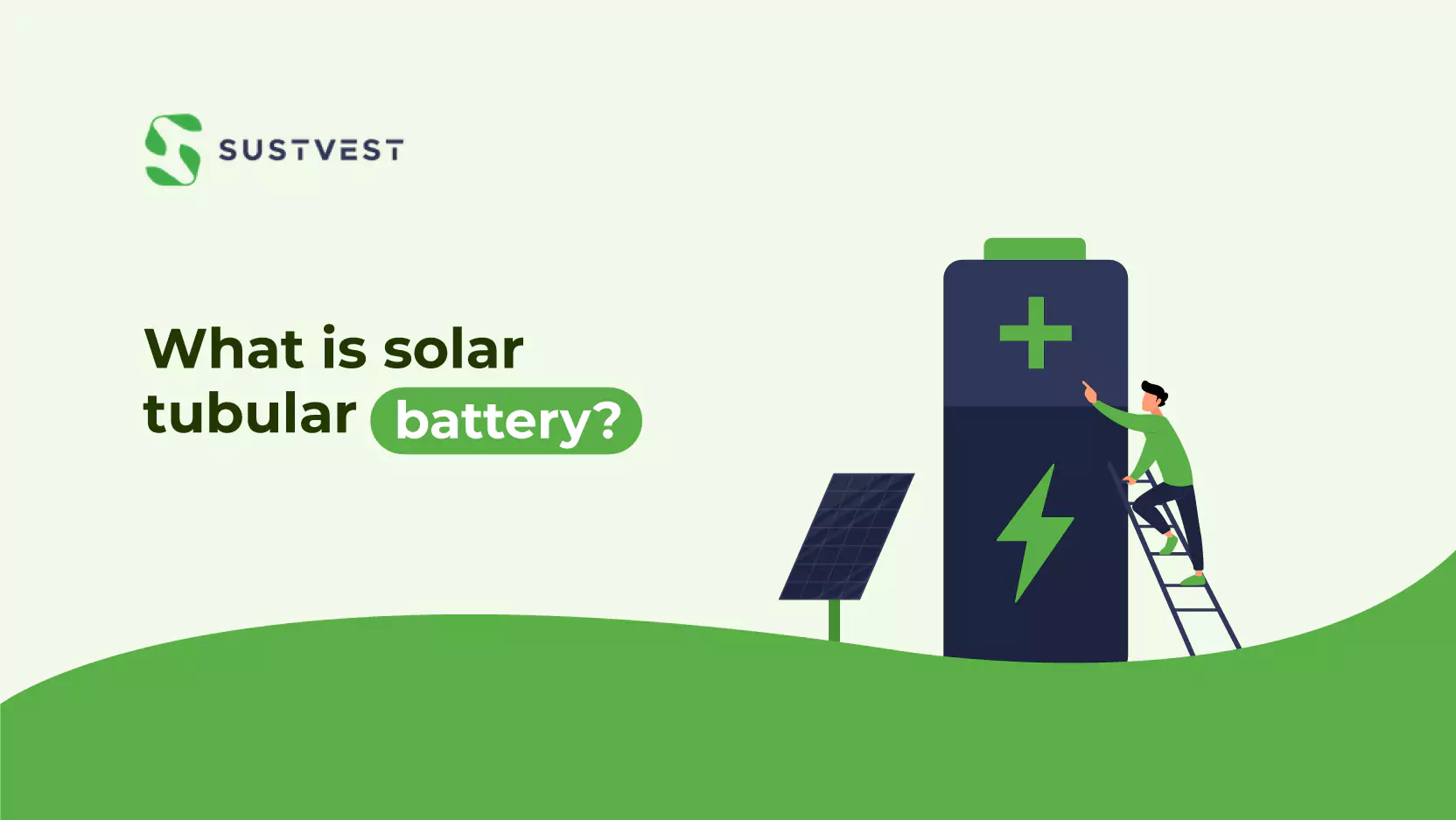Ever experienced a sudden power cut, even when your solar panels were ready to shine? Well, many invest in solar energy, hoping for continuous power. But here’s a fact: The efficiency of your solar system largely depends on its battery.
You might wonder, what is a solar tubular battery? Why is it so essential? Unlike typical batteries, the solar tubular battery is crafted particularly for solar purposes. It stands tall against traditional lead-acid batteries in terms of lifespan, holding a charge, and enduring extensive usage.
In this guide, we’ll delve into the essence of solar tubular batteries, explore their varieties, and guide you on making the best choice for your solar needs.

What is a Solar Tubular Battery?
A solar tubular battery is a specialised type of rechargeable battery designed for energy storage in solar power systems.
Unlike regular lead-acid batteries, solar tubular batteries are constructed with tubular positive plates that enhance their durability and performance. They are optimized to handle the unique demands of solar energy, such as frequent charging and discharging cycles.
Solar tubular batteries efficiently store excess energy generated by solar panels during sunny periods and release it when needed, ensuring uninterrupted power supply in off-grid or grid-tied solar installations. Their durability, efficiency, and deep-discharge resistance make them a preferred choice for solar applications.
Types of Solar Tubular Batteries?
Solar tubular batteries come in various types, each designed to cater to specific solar energy system requirements. The four types of solar tubular batteries include:
- 40 Ah
- 150 Ah
- 200 Ah
- 12 V
Let’s take a close look at them.
1. 40 Ah Solar Tubular Battery
A 40 Ah (Ampere-hour) solar tubular battery refers to a battery with a capacity to deliver 40 ampere-hours of electrical energy. These batteries are specifically designed for solar power systems, where they store and provide electricity.
Their 40 Ah capacity indicates they can discharge a continuous current of 40 amperes for one hour or proportionally lower currents for a longer duration.
These batteries are known for their efficiency and suitability for various solar energy applications due to their capacity and design optimised for solar energy storage.
2.150 Ah Solar Tubular Battery
A 150 Ah solar tubular battery is a type of deep-cycle, lead-acid battery specifically designed for solar power systems.
The “150 Ah” rating indicates its capacity to provide a continuous current of 150 amperes for one hour or proportionally lower currents for longer durations.
These batteries are known for their high storage capacity, making them suitable for storing and supplying solar-generated electricity in off-grid and grid-tied solar setups, ensuring reliable power availability during periods of low sunlight.
3. 200 Ah Solar Tubular Battery
A 200 Ah solar tubular battery is a rechargeable battery specifically designed for solar power systems. It has a capacity to store 200 ampere-hours of electrical energy.
These batteries are constructed with tubular positive plates, offering improved durability and efficiency for solar applications.
They provide reliable power for off-grid or grid-tied solar projects by storing extra solar energy during sunny periods and releasing it when needed.
4. 12 V Solar Tubular Battery
A 12V solar tubular battery is a deep-cycle, lead-acid solar energy storage battery. The 12 volts make it suitable for many solar systems.
These batteries feature tubular positive plates for increased durability and efficiency in handling frequent charge and discharge cycles, making them ideal for storing solar-generated electricity.
They are a popular choice for various off-grid and grid-tied solar installations due to their reliable performance and longevity.
What is the Difference Between Solar Battery and Tubular Battery
Solar batteries comprise a wide range of energy storage devices for solar power systems. It includes tubular batteries as one of its types.
The main difference lies in the construction and purpose. A solar tubular battery, specifically designed for solar applications, features a robust tubular design that enhances durability, deep discharge capabilities, and longer lifespan.
In contrast, a generic solar battery may refer to various battery chemistries and designs, making tubular batteries a specialised subset tailored for solar energy storage.
Here are some other differences you should know:
| Aspect | Solar Battery | Tubular Battery |
| Purpose | Stores excess solar energy for nighttime or backup power. | Used as a backup power source in various applications. |
| Technology | Various types (e.g., lithium-ion, lead-acid) are suitable for different needs. | A type of lead-acid battery specifically designed for deep cycling and prolonged discharges. |
| Efficiency | Efficiency can vary depending on the technology used. | Known for high efficiency and charge retention. |
| Lifespan | Lifespan varies based on the battery type and quality. | Typically offers a longer lifespan due to robust construction. |
| Maintenance | Maintenance requirements can vary; some types may require minimal maintenance. | Generally low maintenance due to durable construction. |
| Cost | Costs vary widely based on the battery type and capacity. | Generally affordable, making them a cost-effective choice. |
Pro Tip: Solar and tubular battery manufacturers and models may vary in detail. Choose between these two batteries based on your energy storage demands and budget.
In the quest for renewable energy, it’s crucial to understand that a Solar Battery Vs Normal Battery – It’s not the same (Know the difference).
Should You Choose a Solar Tubular Battery?
Selecting a solar tubular battery is a wise choice if you seek a robust, long-lasting, and cost-effective energy storage solution. These specialised lead-acid batteries excel in deep cycling, ensuring dependable power backup during cloudy days or nighttime.
Their high efficiency and low maintenance make them a practical option for solar panel systems.
With a longer lifespan compared to some alternatives, solar tubular batteries offer reliability and peace of mind for sustainable energy storage needs.
When considering your energy storage options, it’s worth also pondering on Investing in Solar vs Investing in Bank: Which is the Better Option?
Factors to Consider While Choosing a Solar Tubular Battery
When selecting a solar tubular battery for your solar energy system, several crucial factors should guide your decision:
1. Battery Capacity
Battery capacity (Ah) is crucial as it defines how much energy your solar tubular battery can store. To ensure uninterrupted power supply during nights and cloudy days, choose a capacity that aligns with your daily energy consumption.
A higher Ah rating provides more storage capacity, allowing your solar system to meet your energy needs effectively.
2. Charging Efficiency
Charging efficiency refers to how effectively a solar tubular battery can convert incoming electrical energy from solar panels into stored energy.
A higher charging efficiency allows the battery to capture more solar energy, reducing energy loss.
This speeds up and improves battery power replenishment, improving solar energy system efficiency and performance.
3. Voltage Compatibility
Ensure the solar tubular battery’s voltage matches your solar panel system’s requirements. A mismatch can lead to inefficient energy storage or damage to your equipment.
Check whether your system operates at 12V, 24V, 48V, or another voltage level, and select a compatible battery accordingly to ensure seamless integration.
4. Cost
The cost of a solar tubular battery should balance initial costs and long-term benefits. Due to their resilience and long lifespan, high-quality batteries can save money over time.
Investing in a reliable battery upfront can help you avoid frequent replacements and maintenance costs, ultimately saving you money over time.
5. Warranty
It’s crucial to consider whether you’re willing and capable of performing tasks like electrolyte level maintenance for flooded batteries. Sealed batteries require less upkeep but may have a shorter lifespan.
Your choice should align with your maintenance preferences and abilities to ensure the long-term performance and durability of your solar battery system.
6. Temperature Tolerance
The battery’s temperature tolerance is crucial, especially in regions with extreme weather conditions. It refers to the battery’s ability to perform optimally in varying temperatures.
A battery with a sufficient temperature range can run efficiently year-round, whether you’re in a hot desert or a frigid northern region, improving your solar power system’s reliability.
FAQs
What is the life of a tubular solar battery?
Solar tubular batteries last 5–7 years and are known for their durability. However, good care and use can increase their lifespan.
What’s the price range for a tubular solar battery?
The cost of a tubular battery varies depending on its capacity and brand. On average, you can expect to invest between 12000 to 20000 for a reliable tubular battery.
Is it safe to use a tubular battery in a solar energy system?
Yes, tubular batteries are considered safe for solar applications. They are designed to handle deep discharges and charge efficiently from solar panels, making them a secure and dependable choice for energy storage.
How do I maintain a tubular solar battery?
Regular maintenance is essential. Ensure the battery is adequately charged, keep the terminals clean, and check the electrolyte levels periodically. Following the manufacturer’s guidelines for maintenance is crucial.
Can I use a tubular battery with an off-grid solar system?
Absolutely! Tubular batteries are ideal for off-grid solar setups. They can store excess solar energy during the day for use at night, providing a consistent power supply in remote areas or during power outages.
Conclusion
A solar tubular battery is essential for maximising solar energy. Its longevity, efficiency, and capacity to store power for nighttime and power outages make it a good solar panel system choice.
When considering sustainable energy solutions, understanding the benefits of solar tubular batteries is essential.
As you make your choice, don’t forget to explore What is Rec in solar power and why is it important for a well-rounded understanding of solar energy storage.
For more detailed information and tips on sustainable living, visit Sustvest —a great resource for eco-conscious individuals. Make the right choice with your solar tubular battery and contribute to a greener, more sustainable future.

Founder of Sustvest
Hardik completed his B.Tech from BITS Pilani. Keeping the current global scenario, the growth of renewable energy in mind, and people looking for investment opportunities in mind he founded SustVest ( formerly, Solar Grid X ) in 2018. This venture led him to achieve the ‘Emerging Fintech Talent of the Year in MENA region ‘ in October 2019.




